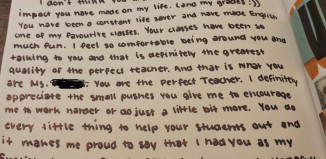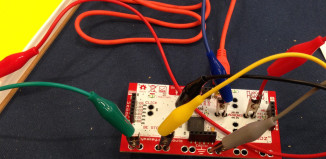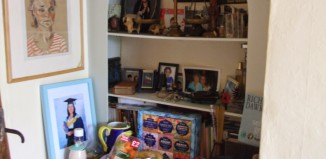Home Syndicated
Syndicated
This is the firehose, all external content syndicated into the site.
Why I Teach
It is the end of the year which means teachers are super busy (hence my lack of posts). We are trying to finalize grades, manage students bouncing off the wall (literally and figuratively), clean our classroom, mange parents who just now realized their...
Trails within Trails
Last night I was proctoring final exams for my Computer Organization class. The students were quietly busy, and I was able to work on a variety of things on the computer. Later, I took screenshots of my browsing history (thinking … Continue reading →
How does it feel when I think?
How does it feel when I think? There’s this Gary Snyder poem called “How Poetry Comes to Me” that reads: It comes blundering over the Boulders at night, it stays Frightened outside the Range of my campfire I go to meet it at the Edge of the light I like this image of a poem […]
A Few Words About Taking Risks
My hopeful audience for this blog post is my Univ 200 Summer MOOC students in Section 008. But truthfully, because our blogs are aggregated on the thoughtvectors.net site, anyone who visits our site or joins our open online course can read this post —– which means, anyone can see the video above, which I made […]
#ThoughtVectors – Observations on a Great Educational Experiment – Predawn
This is a reflection on a great experiment: a thought experiment, a learning experiment, a teaching experiment, a social experiment, an experiment in connectivity and the potential power of associative trails. The VCU UNIV200 (inquiry and the art of argument) summer MOOC website launches tomorrow! http://thoughtvectors.net My role is that of a participant-observer. I have an […]
What People Love and Hate about eLearning Infographic
What People Love and Hate about eLearning Infographic.
Some students may not need to participate to learn… WAIT? WHAT?!!
Recently, I read about a study titled Learning or Lurking? Tracking the ‘Invisible’ Online Student by Michael Beaudoin that found that while students who interact a lot in online classes perform well in the class, those students who interacted the least performed higher than the moderate interaction group. This could leads to a conclusion that some…
Teaching Using Google Glass and Apps
The Journal of Interactive Technology and Pedagogy has just published a Tool Tips article I wrote on how I’m using Google Glass and Apps to support my teaching at Virginia Tech. The multimedia format of the journal offers a unique opportunity to embed pictures and videos in the article that provide a rich context to the […]
Some Music and Writing Sessions
We have just had a great discussion on the www.jiscmail.ac.uk/ldhen list about Writing Retreats – that developed into thoughts on Music workshops. So here are our ideas from this day in May 2014 – it would be great if you could share your own creative strategies for getting students to write – or just getting them to be with each other in engaged and engaging ways. This post looks at Sing-Write; Rich Writing; Make music like Mozart; Free writing prompts; Academic free writing.
Sing-Write and find your voice – from John Hilsdon:
“I’m planning a ‘sing-write’ (finding your voice) event for the Plymouth Writing Café in the autumn - and the warm-up we will do is this:
All stand in a circle
Breathe together, in through nose and out through mouth in time with the leader for about 30 secs
Shake arms
Shake legs
Shake head
Relax all muscles and shake whole body
All say brrrrr (as if it’s cold!) and make the lips vibrate! If they won’t put a finger lightly on each cheek and try again
Make the brrrrr go all the way up to the highest note you can then all the way down to the lowest note
Repeat!
All sing the sound ‘ng’ like in the ‘dong’ of a bell – (leader leads with the note to sing this together)
Repeat - different notes - following the leader
All say “blah blah blah” and start to wander around the room in any direction saying this continually – try different notes and changing the ‘tune’ whilst still saying blah blah blah!
All sit and close eyes
Have one minute of silence with eyes closed
Take pen/paper and free write whatever comes to mind for 3 minutes.”
Be with for an hour: Rich writing: A variation on the sit in silence for a minute:
On our Art History MOOC - one rich writing activity that we had to do was to sit with an art work for an hour. We had to find a piece that was interesting or meaningful for us and then be with it - we could make notes or anything - but we had to quietly be with it for a whole hour. We then had to write 300 words on the artwork.
I chose to sit with the picture of my mum (on the wall in the photo below) - and found the exercise both moving and really useful. After the hour I had more notes than I could use in a 300-word write up. It was a really rich experience.
More Music - From Craig Whittaker: Make music like Mozart
Ask your delegates to think of a sound that they can make. If they claim to be having difficulty, then examples of sounds could be clapping, popping, shrieking, humming etc.
Have them all make their sound as they walk around the room, and just enjoy the noise.
Encourage them to play with the sound - to change it or make it louder, or more unusual.
After a couple of minutes of this, ask them to stop, and to think what colour and shape the sound is. (Provide plenty of coloured markers and a white-board or flip-chart for this.)
Then invite someone to draw their sound on the board, and to repeat it at regular intervals across the board. This will form the base-line around which the rest of the composition will be built. Have them make the sound to illustrate what it will sound like.
Repeat the process with other volunteers until you have a composition of around five to seven sounds.
Now appoint a conductor who will cue the performers when to begin. The resulting sounds should pleasantly surprise the delegates, and illustrate the principle of synaesthesia.
Even more Music:
For those whose interest in MUSIC have been piqued: when we had a music session led by Dave Griffiths of our CELT with our students he developed our music as follows:
- initial sound-making – with voice or rudimentary instruments or real instruments
- call and response
- round singing (London's burning)
- into groups composing music in response to a picture - and performing for each other.
- A finale activity was to choose the audience before whom we had to perform - we chose Glastonbury - it was fabulous!!!
More Free Writing
* Choose a postcard sight unseen from a pack – turn over – see picture – write
* Choose an object from a sack – write
* Have two pieces of paper in front of you – focus on something you can see, hear, feel, smell – write… If you stop writing, write the reason for stopping on the second piece of paper. Reflect on the activity.
Academic Free writing workshop
Set up a session of one to one and a half hours long.
Ask students to have two sheets of paper in front of them - one for writing and one for writing why they are not writing.
After reassuring the students that their writing will not be marked - put up a relevant assignment question (either one that they have been set - or a relevant one that they might have been set) - ask them to write without stopping for ten minutes on the question - and to write the reason why they have stopped (for they will) on the second sheet.
After ten minutes structure three reflections:
* What was your reaction to that process?
* Why did you stop writing?
* What can you take from this process into your other academic writing?
What is interesting is that whilst for academics the writing issue often is: 'Students can't write - their spelling, punctuation and grammar are awful.' The issue for students is overcoming a fear of writing - so space to discuss their feelings about writing can be the freeing activity.
YOUR TURN!!
Small Printer Speaks to Large Issues: Online Reviews and Research Epistemology
Originally posted on The Next Bison: Social Computing and Culture:
Are online reviews fair? Consider these reviews of a small printer, the Canon Pixma MG6320 on the Consumer Reports website. At the time I am writing, there are three reviews, and all three writers gave it one star out of a possible five—the worst possible…
Are online reviews fair? Consider these reviews of a small printer, the Canon Pixma MG6320 on the Consumer Reports website. At the time I am writing, there are three reviews, and all three writers gave it one star out of a possible five—the worst possible…
What if (we fail)?
I’m not sure who first introduced the What If? site in one of our cMOOC meetings, but this link takes you to the following user- generated question on the site: What if everyone actually had only one soul mate, a random person somewhere in the world? Because I have (awesome) young adult children, ages 20, […]
Random Path to a Defined End? or MOOCS, Mapping and Madness?…You Decide
This post (and future series of posts) is an attempt to figure out what I’m observing. It’s a reflection, so “abandon all hope ye who enter here.” I was asked to join in on a conversation centered on VCU’s summer 2014 MOOC entitled Inquiry and the Craft of Argument (UNIV 200). Let me be the first […]
Reading Literature for Future Teachers: It’s Like This
English 341: Yeah, It’s Like This.
Technology Literacy Collaborative
Teach the Web A worldwide collaboration to Teach the Web is happening this summer. Do not worry about joining late. These activities are designed for anyone, anywhere, and at any time, and in any order. Sign up to enroll and learn creative ways to teach web literacy, digital skills and open practices with fellow educators, technologists […]




